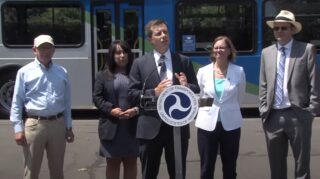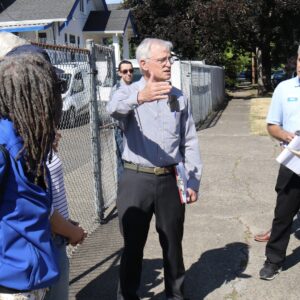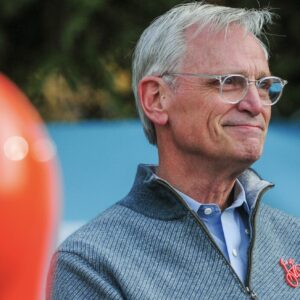
These are wild times for climate change in America. We have floods and droughts and fires and heat waves — scary, deadly, catastrophic events — unfolding in front of our eyes as policymakers scramble to satisfy an anxious public and activists increase the volume of their pleas.
Yesterday in Eugene, the Biden Administration’s top transportation leader, US Department of Transportation Secretary Pete Buttigieg appeared at a press conference with U.S. Congressmen and Chair of the House Transportation & Infrastructure Committee, Peter DeFazio. They and other officials spent the day viewing safety challenges on Highway 99 in Corvallis and driving an all-electric bus. The high-profile visit was part of a tour to tout Biden’s Bipartisan Infrastructure Framework.
As the climate issue heats up, so too are calls to use transportation policy as a way to address it.
DeFazio spoke in stark terms about the climate crisis during his remarks. “This is the 21st century, the Eisenhower [Interstate Highway] Plan was built for the existential threat of the time; invasion by Russia so we could move troops and equipment quickly to the coasts. Or nuclear war, so we could evacuate our cities. We have a new existential threat,” DeFazio said. “And that’s climate change… We have to deal seriously with this.”
Advertisement
“In too many places around the country in the automobile era, we designed everything for throughput of automobiles, and no thought to pedestrians, no thought to to cycling or alternative modes.”
— Peter DeFazio, U.S. House Representative
DeFazio then hyped-up the spending outline of the $579 billion proposal. Most of his excitement seemed to be around electrification of transportation because he sees how production of batteries and other related hardware (500,000 electric vehicle charging stations) could boost the jobs appeal of the package (and earn Republican support).
And in a sign of how far the concept of transportation justice and equity have come in the past few years, DeFazio said, “In too many places around the country in the automobile era, we designed everything for throughput of automobiles, and no thought to pedestrians, no thought to to cycling or alternative modes. Just move the traffic as quickly as possible.” “We divided communities of color. And that was done in many places intentionally,” he continued. “We can still have traffic, but we can have it safe for cycling and pedestrians and others. And we can also restore social equity.”
It’s very notable to have DeFazio — chair of the House T & I Committee and one of the most respected voices on transportation on Capitol Hill — speak so clearly about the ills of our car-centric highway legacy.
Buttigieg also made climate change central to his pitch. “Oregon unfortunately, like so many other places in the world has reminded us of what’s at stake in the climate crisis,” he said. “Things that we had talked about maybe going to happen in the middle of this century, that instead happened last week. Things that are only going to accelerate and become more and more damaging if we let them… The climate crisis isn’t just coming. It’s it’s upon us.”
Like DeFazio, Buttigieg made some space for cycling in his comments. He said “bicycle commuting and bicycle recreation,” are “especially important” for the future of our cities. The framework includes $10 billion for “safety,” and Buttigieg said nearly half of that would go toward projects that will allow people to walk or use a wheelchair or use a bike safely, “and don’t have to bring two tons of metal with them everywhere they’re going.” Another way the plan will make it easier to live a low-car lifestyle is the $50 billion set-aside for public transit, which would be the largest such investment in American history.
Words matter when it comes to organizing and persuasion, but a warming planet can’t hear them. These politicians must deliver bold funding and policy measures if we want to stem the tide of this crisis. While there’s been promising momentum of late, there’s still a lot of negotiations and politics to come. Senate Majority Leader Chuck Schumer has set a July 21st deadline to stop talking and start moving forward with the legislation.
— Jonathan Maus: (503) 706-8804, @jonathan_maus on Twitter and jonathan@bikeportland.org
— Get our headlines delivered to your inbox.
— Support this independent community media outlet with a one-time contribution or monthly subscription.







Thanks for reading.
BikePortland has served this community with independent community journalism since 2005. We rely on subscriptions from readers like you to survive. Your financial support is vital in keeping this valuable resource alive and well.
Please subscribe today to strengthen and expand our work.
Lots of hot air. Somehow I just can’t see any of them taking a 3-day train journey (even with a 1st class sleeper) from DC to Eugene, then hopping on a bicycle to the event. They somehow strike me more the type of what Donald would do: A wasteful motorcade to Dulles (complete with a security detail), then a US government flight to Eugene (or maybe PDX), then another expensive gas guzzling motorcade to the event, with the media in tow. The more things change, the more they remain the same.
The road to sustainability is not paved by individual consumption or travel choices. It will take large scale, macro economic policy and taxation. Normal people will not c hoose low carbon lifestyles unless they are incentivized to do so. Politicians can make positive climate impacts by passing legislation even if their personal carbon footprint is outrageously huge. Life is not a moral purity test.
This is amusing because you are literally claiming that the road to sustainability is paved in individual consumption choices. Unfortunately, simple “incentives” are not enough — massive societal transformation is essential to avoiding the worst outcomes.
Fantasizing that “politicians with outrageously high personal carbon footprints” are going to save us is as silly as Ralph Nader begging billionaires to save us.
If mayor Pete sees the light tomorrow and decides to live like a monk, it’s not going to get America any closer massive societal transformation.
would be entertaining to see whose list Pete resides on. .
but you want the government to “incentivize” people to live like a monk — as if this makes even the tiniest bit of sense.
moreover, your framing of the lifestyle changes needed to begin to address the climate crisis as “living like a monk” is straight out of the alt-right’s “those GND communists are going to pry my bacon cheeseburger out of dead hands” playbook.
Nice straw man. I never said people should be incentivized or forced to live like monks. But the person I was responding to seems to think that if politicians fly on planes, they are somehow incapable of making transformative change in our economy and energy system, which is somewhere between a non sequitur and an ad hominem. But either way, it doesn’t make sense. I was using the idea of living like a monk as the logical conclusion of this line of reasoning: ‘if you produce any carbon emissions at all, you are morally impure and therefore incapable of doing anything to address climate change.’
Incentives (and the other side of the coin, disincentives) such as duties, taxes and fees (or tax breaks and rebates) can be used to discourage the use of fossil fuels. We have a market based economy, a transportation network that is built for SOVs and a democratic (for now) electoral system. You can’t mandate that people give up their cars or stop buying cheap plastic junk from highly polluting manufacturers without totally redefining what freedom means to tens of millions of Americans. You can make polluting lifestyles a less attractive choice through price signals, but the alternative is antithetical to a definition of America that many are loathe to abandon.
And yes, you can mandate a conversion from fossil fuel energy production to renewables at the utility scale, but that alone will not solve America’s carbon emissions problem. Transportation and heating fuels will not automatically become green just because you have a power grid that is 100% renewable. You need a strong incentive (or disincentive) program to spur the conversion and adoption off green technology at the consumer scale. But no reasonably solution will involve the complete end to fossil fuel based air travel, at least not this century.
Politics are the art of the possible. If you want to avoid a climate catastrophe, focus on solutions that have a realistic chance of being implemented.
It’s nice to see that you are walking back the idea that making modest and easy low-carbon choices is equivalent to “living like a monk”. I personally think the “living like a monk” smear smacks of climate-science denial, at a minimum.
“I never said people should be incentivized… ”
Drs:
What you say I wrote:
“seems to think that if politicians fly on planes, they are somehow incapable of making transformative change in our economy and energy system”
What I actually wrote:
“Fantasizing that “politicians with outrageously high [your words] personal carbon footprints” are going to save us is as silly as Ralph Nader begging billionaires to save us.”
It’s interesting how you are switching from an “outrageously high carbon footprint” to the mere act of “flying on a plane. AOC occasionally flies on planes but I suspect her carbon footprint is very low compared to that of the average USAnian.
My entire point was that it’s naive to expect that someone who is unwilling to make even modest accommodations in their own lives to take on the enormous political risk of “making positive climate impacts”.
Honestly, it’s exhausting to even try to have a conversation with you. Obviously ‘living like a monk’ was hyperbole. I’m not walking back anything.
My ‘seems to think that politicians…’ remark was made in regards to the original comment that I was replying to, which was made by David Hampsten, not you.
Most Americans have outrageously high carbon footprints. I’m sure AOC is consuming at a level that would be nowhere near sustainable if projected out to a 7+ Billion global population. So I would say that her carbon emissions probably are outrageous, in an absolute sense, even if she is nowhere near as egregious as someone like Trump. The same applies to defazio and Pete. If everyone in the world flew on airplanes or traveled in private motor vehicles as frequently as Americans do on average, we’d have a very hard time reducing global carbon emissions. I’m sure AOC does those things at least as frequently as an average American.
If the goal is massive societal transformation, criticizing a politician for failing to make modest accommodations while trying to do big political things is pennywise and pound foolish and it is exactly the kind of arguments that alt right commentators make when criticizing Democrats when they attempt to push climate legislation.
“Obviously ‘living like a monk’ was hyperbole. I’m not walking back anything.”
You just walked it back but it’s unfortunate that you are still defending your mockery of GHG mitigation pathways. Anyone who has spent 15 minutes skimming through the SR1.5 Summary for Policy Makers Section would realize that decarbonization does not require a lifestyle of deprivation and material poverty.
I also note that you have moved your goalpost from the naive hope that politicians with “outrageously high personal carbon footprints” (e.g. a Trump or Ted Cruz) will save us to a strawperson: “criticizing a politician for failing to make modest accommodations”.
“criticizing Democrats”
The democratic party has a 40+ year record of abject failure when it comes to the climate crisis. How can anyone who cares about the climate crisis not be critical?
You’re fooling yourself if you think that Americans can achieve a carbon neutral lifestyle without making changes that would be viewed by average middle class Americans as a form of privation. They might have to put on a sweater when in the house in winter, significantly reduce the number of days that they run their AC in summer, and give up the majority of trips that they take in SOVs. They’d also have to stop buying cheap, disposable clothes and reduce the amount of meat and dairy products they consume. Those seem like pretty reasonable accommodations, to me. But I’d love to see a politician come out and say that they support policies that would ensure that all Americans have to make these types of changes. They wouldn’t win an election, I can tell you that. Not even in liberal Portland.
I agree that there is plenty to criticize about the weak environmental policies that have been pushed by the Democratic party since the 80s. But there aren’t any parties that are doing anything better, and the Republicans would vote to set the world on fire rather than do anything to curb CO2 emissions.
Truly do not understand how they can talk like this, as if expanding highways through Black neighborhoods is a thing of the past, rather than something that the Oregon Department of Transportation is pitching as restorative justice right now. Buttigieg could stop this and call for a moratorium on new highway construction. He could fix and improve so much.
Incentivizing the use of electric cars is not moving away from “the ills of our car-centric highway legacy” but making it worse. What are these 500,000 electric charging stations going to look like? We’re basically paving even more of the surface of the earth where cars will sit (doubtless with AC on) while they charge for hours. At least gas stations have a smaller footprint and fairly quick turnover. The automobile experiment turned our towns into high-temperature highways and parking lots instead of useful, productive, and pleasant places for people. To promote the spread of electric cars is to accept these mistakes and multiply them.
It’s hard to see this bill as a step in the right direction. It looks like at best 90 percent of the money will go for freeways and other combustion, with only some comparative pittance for transit and a weensy pittance for bikes. It’s better than pevious efforts, but, if your house is on fire, promising to only throw 90% of the bucket of gasoline on it isn’t terribly helpful.
And the “climate hawks” in the USA want to throw away 50% the gasoline.
Low carbon footprint = the need for drastically restricted movement to ~ 50 miles around one’s domicile (easily doable with a bike/electric assist). So cool if you are restricted to Bozeman MT, sucks, if it’s 1 ft under water in Dakha, Bangladesh 🙂